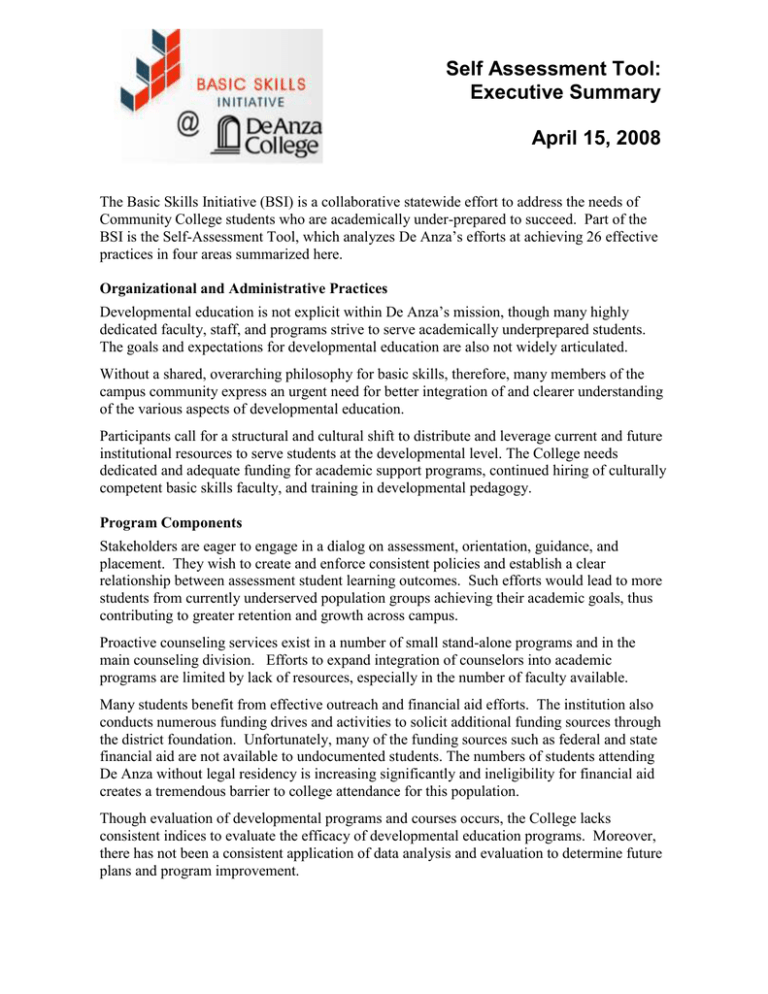Executive Summary in Word
advertisement

Self Assessment Tool: Executive Summary April 15, 2008 The Basic Skills Initiative (BSI) is a collaborative statewide effort to address the needs of Community College students who are academically under-prepared to succeed. Part of the BSI is the Self-Assessment Tool, which analyzes De Anza’s efforts at achieving 26 effective practices in four areas summarized here. Organizational and Administrative Practices Developmental education is not explicit within De Anza’s mission, though many highly dedicated faculty, staff, and programs strive to serve academically underprepared students. The goals and expectations for developmental education are also not widely articulated. Without a shared, overarching philosophy for basic skills, therefore, many members of the campus community express an urgent need for better integration of and clearer understanding of the various aspects of developmental education. Participants call for a structural and cultural shift to distribute and leverage current and future institutional resources to serve students at the developmental level. The College needs dedicated and adequate funding for academic support programs, continued hiring of culturally competent basic skills faculty, and training in developmental pedagogy. Program Components Stakeholders are eager to engage in a dialog on assessment, orientation, guidance, and placement. They wish to create and enforce consistent policies and establish a clear relationship between assessment student learning outcomes. Such efforts would lead to more students from currently underserved population groups achieving their academic goals, thus contributing to greater retention and growth across campus. Proactive counseling services exist in a number of small stand-alone programs and in the main counseling division. Efforts to expand integration of counselors into academic programs are limited by lack of resources, especially in the number of faculty available. Many students benefit from effective outreach and financial aid efforts. The institution also conducts numerous funding drives and activities to solicit additional funding sources through the district foundation. Unfortunately, many of the funding sources such as federal and state financial aid are not available to undocumented students. The numbers of students attending De Anza without legal residency is increasing significantly and ineligibility for financial aid creates a tremendous barrier to college attendance for this population. Though evaluation of developmental programs and courses occurs, the College lacks consistent indices to evaluate the efficacy of developmental education programs. Moreover, there has not been a consistent application of data analysis and evaluation to determine future plans and program improvement. Staff Development De Anza currently employs dedicated faculty and staff whose core responsibility is to coordinate staff development programs. New faculty members are provided with an ongoing orientation, though it lacks a focus on developmental education faculty and there have not been adequate resources (such as funding and staffing) to offer comprehensive, ongoing staff development programs designed for developmental educators and content area faculty who teach students enrolled in developmental courses. In addition, there is very little correlation between developmental education goals and staff development offerings. Currently, developmental education faculty are not formally involved in designing, planning, implementing or evaluating staff development activities for the general campus. Although, there is a structure for the campus to provide extrinsic reward for professional growth, there are few opportunities of faculty across disciplines to communicate and collaborate to develop a community of scholars. Instructional Practices Sound principles of learning, problem solving, and critical thinking are employed in developmental education courses, particularly in certain programs, but it is difficult to determine how consistently or frequently this practice occurs in individual class sections throughout the campus. Specialized programs in Language Arts (such as LinC, ESL and Portfolio sessions) and Math (MPS and Enable Math), implement effective curricula for their particular disciplines and tutoring and learning labs are an integral part of such their success in serving students. Student cognitive and emotional needs are met both in and outside of the classroom through individual faculty in the courses they teach and programs such as First Year Experience, Puente program, MPS, Counseling Courses, Educational Diagnostic Center and Student Success Center. Additionally, programs such as EOPS/CARE and OTI/Cal Works, DSS, EDC and LEAD assist students as they face obstacles that may hinder their success so they can be retained. Many faculty employ culturally responsive theory and pedagogies, though these practices are not used institution-wide because few faculty have training in this area. Excellent classroom learning opportunities should be coupled with an academic support program that is adequately funded and fully institutionalized. Services must be highly visibly, centrally located, and provide diverse learning opportunities including workshops, tutoring, study groups, multi-media instruction, and self-paced instruction. While such services exist, they lack space, status, and funding. Stakeholders also recognize the compelling need to align and create uniformity in individual course outlines, entry and exit standards, as well as ensure that students move through the developmental sequence and are adequately prepared for transfer level coursework. Broad avenues for communication to facilitate the exchange of effective instructional strategies between faculty within and across disciplines at all levels is also key to ensuring consistency in the classroom.

